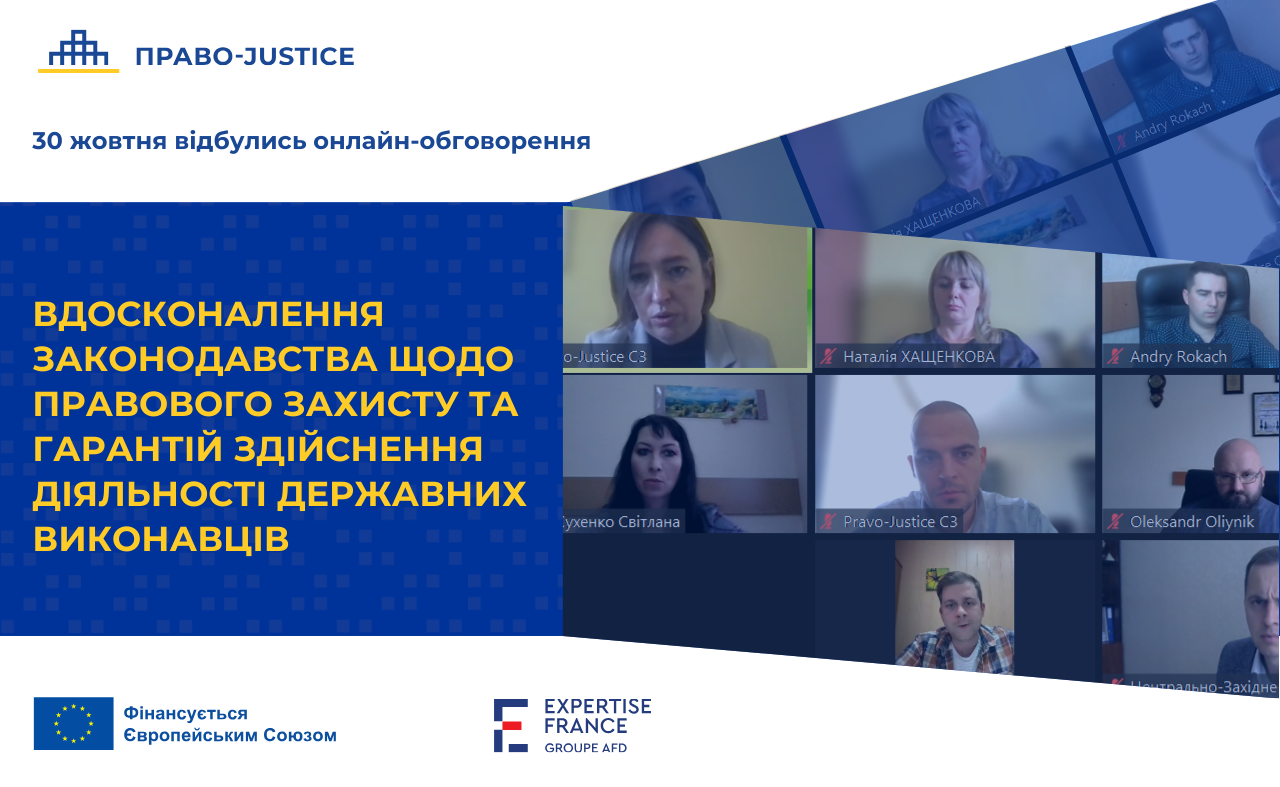Online Consultations on Legal Protection and Guarantees for the Activities of State Enforcement Officers Were Held

Within regular annual monitoring of the implementation of adopted legal acts and analysis of their effectiveness, the Ministry of Justice of Ukraine held online consultations on improving legislation in the field of enforcement. Representatives of the State Enforcement Service, academia, and EU Project Pravo-Justice national experts joined the discussion.
The online consultations held on 30 October focused on legal protection and guarantees for ensuring independent activities of state enforcement officers, introducing incentive mechanisms, and improving logistical support.
“In August, we conducted a survey of enforcement officers on the Online Monitoring Platform to identify the problems they face in their practical activities. And today we want to hear how you see the ways to solve them, what legislative or regulatory changes you consider necessary,” said Oleksandr Oliinyk, Director of the Directorate of Justice and Criminal Justice of the Ministry of Justice of Ukraine, in his welcoming remarks.
In her speech, Iryna Zharonkina, Property Rights and Enforcement Component Lead of EU Project Pravo-Justice, spoke about the established systems of enforcing court decisions in the EU and recommendations of the Council of Europe on enforcing court decisions.
“Systems for enforcing court judgements can be broadly divided into those that are subordinated to the judiciary or to an executive authority (the Ministry of Justice) or those where enforcement officers are self-employed. Neither the European Commission nor the Council of Europe has a definite position on the advisable professional or institutional status of enforcement officers, noting that any enforcement system can be effective. According to the recommendations of the Council of Europe, the enforcement system should ensure the right to a fair trial, be efficient and fair. However, according to the International Union of Judicial Officers, it is the system where the enforcement of court decisions is entrusted to the State Enforcement Service that has the highest corruption risks and requires significant investments to ensure effective operation”, said Iryna Zharonkina.
During the online consultations, state enforcement officers also spoke about the problems they face in their professional activities. The main problems include difficult working conditions and weak protection of enforcement officers from debtors’ actions, high workload and staff turnover. This last problem is caused by low salaries, poor logistical support, and low support for SES staff who were forced to relocate from the temporarily occupied regions or areas affected by active hostilities. According to the enforcement officers, very often their monthly salary is UAH 7-10 thousand.
In particular, state enforcement officers emphasised the problem of non-transparent calculation of remuneration for the enforcement of court decisions. State enforcement officers also emphasised that it is necessary to improve the functioning of the Automated System of Enforcement Proceedings, access to and coverage of various state registers, data exchange between state institutions and banks, and the ability to identify the actual location of debtors. Among other things, the issue of actually providing guarantees to protect state enforcement officers from verbal and physical threats from debtors who do not want to enforce court decisions was raised.